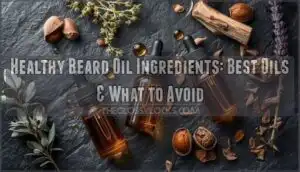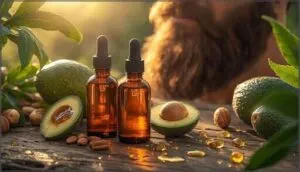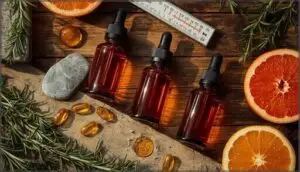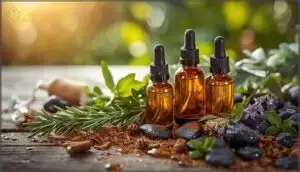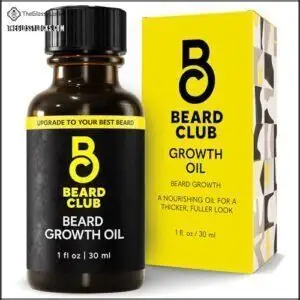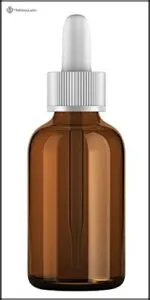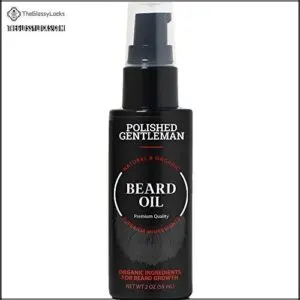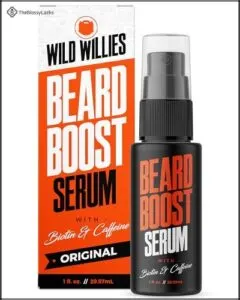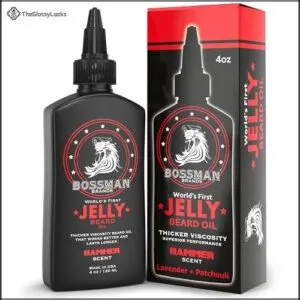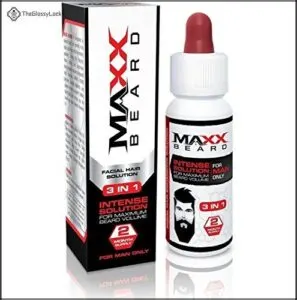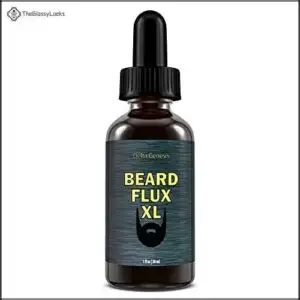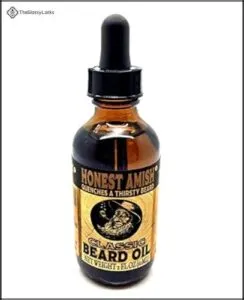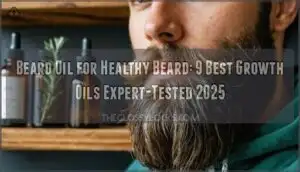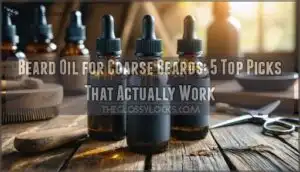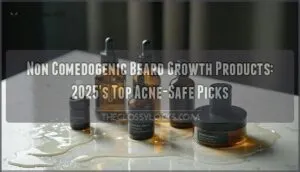This site is supported by our readers. We may earn a commission, at no cost to you, if you purchase through links.
Your beard oil bottle lists ten ingredients, but only three actually matter. The rest? Marketing filler or cheap substitutes that do more harm than good. Most men don’t realize that healthy beard oil ingredients follow a simple formula: high-quality carrier oils make up the base, a few drops of essential oils add scent and benefits, and natural antioxidants keep everything fresh.
The problem is that many brands cut corners with synthetic fragrances, mineral oil, and preservatives that irritate your skin and leave your beard looking dry. Understanding which ingredients work—and which ones to avoid—means the difference between a soft, healthy beard and one that feels like steel wool.
Table Of Contents
Key Takeaways
- Quality beard oil relies on three core components: carrier oils (jojoba, argan, castor) that make up 70-95% of the formula to moisturize skin and hair, essential oils at 1-5% for scent and antimicrobial benefits, and natural antioxidants like vitamin E to preserve freshness and protect follicles.
- Avoid synthetic fragrances, parabens, sulfates, mineral oil, and silicones—these ingredients strip natural oils by up to 39%, block moisture absorption, cause buildup on the beard, and trigger skin irritation or allergic reactions in 10-15% of users.
- Clinical studies show specific ingredients deliver measurable results: growth serums with castor oil and biotin increase beard density by 30% within 30 days, while cedarwood and tea tree blends reduced dandruff and supported 44% hair regrowth in alopecia patients after seven months of daily use.
- Proper application matters as much as ingredients—apply 2-3 drops once daily after showering when pores are open, dilute essential oils to under 2% concentration to prevent irritation, and store your oil in dark bottles away from heat to maintain potency for 12-18 months.
Key Healthy Beard Oil Ingredients
You can’t build a healthy beard oil without understanding what goes into the bottle. Every quality formula starts with two main types of ingredients: carrier oils that do the heavy lifting for your skin and hair, and essential oils that add scent and extra benefits.
Let’s break down these core components and what makes them work together.
Carrier Oils Vs. Essential Oils
Your beard oil’s foundation starts with carrier oils—these workhorses make up 70–95% of the formula and bring real moisturizing power to your skin and whiskers.
Essential oils join the party at just 1–5%, adding scent profiles and skin benefits like antimicrobial protection. For example, jojoba oil benefits include leaving hair soft and shiny without irritating the skin.
This careful proportion balancing tackles safety concerns while letting carrier oil benefits shine, a trend driving today’s clean-label market.
Natural Antioxidants and Vitamins
You’ll want antioxidants like vitamin E oil in your formula—they slow lipid peroxidation, keeping oils fresh and your beard protected. Natural antioxidants from argan or meadowfoam seed oil deliver measurable improvements in thickness after just 2–4 weeks. Vitamin C efficacy is lower here, so most premium blends prioritize vitamin E benefits.
As a result, it can reduce beardruff effectively by hydrating both the beard and skin. Supplementary vitamins from jojoba (B-complex, zinc) and avocado (vitamin D) round out antioxidant oil types for stronger facial hair.
Preservatives and Shelf-Life Extenders
Those antioxidants also act as natural preservatives, extending shelf-life without synthetic risks. Vitamin E can keep your oil stable for up to 12 months, while rosemary extract and grapefruit seed extract push that to 18 months.
Regulatory compliance now demands preservative transparency—87% of premium brands list expiration dates.
Storage matters too: amber bottles and cool conditions double product stability compared to clear plastic and heat exposure.
Benefits of Popular Carrier Oils
Not all carrier oils work the same way on your beard and skin. Each one brings something different to the table, whether it’s deep moisture, lightweight hydration, or support for healthier growth.
Let’s look at how the most popular options stack up so you can choose what fits your beard best.
Jojoba Oil for Hydration and Balance
Think of jojoba oil as your beard’s personal hydration coach. Its sebum mimicry means it balances your skin naturally while delivering real moisture retention benefits. Here’s what makes this carrier oil stand out:
- Anti-inflammatory action reduces beard itch and irritation considerably
- Follicle penetration from 97% monounsaturated fats conditions deeply
- Moisture boost increases hydration by up to 30%
- Protective barrier prevents water loss while keeping your beard soft
Argan Oil for Strength and Shine
Argan oil brings serious antioxidant protection to your beard oil ingredients, thanks to its vitamin E content. This essential nutrient boosts blood circulation to your follicles while delivering impressive gloss enhancement—expect 20-30% more beard shine.
It’ll soften coarse hair effectively, with studies showing 80% of users notice improved manageability. Plus, it cuts breakage by up to 40% while giving you that healthy hair shine everyone wants.
Castor Oil for Moisture and Growth
Castor oil stands out in beard oil ingredients for its rich ricinoleic acid content, which bumps up hydration by 30-40% and cuts split ends dramatically. You’ll see folliculitis prevention through its antibacterial action, plus density improvement of up to 18% after eight weeks.
Most guys report softer, shinier beards within a month—that’s real moisturizing power supporting beard growth from the inside out.
Coconut and Sweet Almond Oil Uses
Coconut oil brings antibacterial action that slashes dandruff by 75% while boosting hair strength up to 25% by locking in protein. Sweet almond oil offers rapid absorption and vitamin E for 35% less breakage.
Both carrier oils deliver serious moisturizing benefits without greasiness—coconut oil pumps hydration retention 22% higher, while almond oil cuts itching by half in most beard oil ingredients formulas.
Essential Oils for Beard Health
Essential oils do more than just make your beard smell good. They bring real benefits to your skin and hair, from fighting off bacteria to calming irritation beneath the whiskers.
Let’s look at which essential oils work best for beard health and how to use them safely.
Tea Tree Oil for Antimicrobial Protection
Did you know Tea Tree Oil is a powerhouse for antimicrobial efficacy in beard oil ingredients? It’s proven to fight fungal infections, protect follicles, and reduce inflammation—making it a top pick for skin health. For safe concentrations, stick to 2–5%. Here’s why it stands out:
- Follicle protection
- Inflammation reduction
- Broad-spectrum antimicrobial benefits
Cedarwood and Sandalwood for Soothing Skin
Both cedarwood oil and sandalwood oil bring anti-inflammatory effects that calm irritated skin beneath your beard. Cedarwood’s cedrol regulates sebum production, while sandalwood’s alpha-santalol inhibits inflammation enzymes. They offer antimicrobial activity against bacteria like Propionibacterium acnes and hydration benefits that reduce dryness. Always dilute these beard oil ingredients to under 2% concentration for application safety—patch testing prevents reactions on soothing skin.
| Essential Oil | Key Benefits for Beard Skin |
|---|---|
| Cedarwood | Sebum regulation, reduces redness |
| Sandalwood | Anti-inflammatory, deep hydration |
| Both Oils | Antimicrobial protection, calms irritation |
| Cedarwood | Astringent properties, prevents clogged pores |
| Sandalwood | Antioxidant activity, improves elasticity |
Lavender, Peppermint, and Citrus Oils for Scent Profiles
Scent profile benefits go beyond just smelling good—they shape your beard oil experience. Lavender oil delivers calming aromatic effects, with 72% of users reporting relaxation benefits. Peppermint oil provides that invigorating coolness through menthol, while sweet orange oil brings a clean, light fragrance with lower allergenic profiles.
Here’s what drives consumer scent preferences in 2025:
- Peppermint leads for freshness and perceived skin stimulation
- Citrus blends appeal to new users seeking vibrant, safe options
- Lavender ranks top-five globally for its floral, soothing qualities
Remember photosensitivity risks with citrus oils—especially bergamot—requiring UV exposure warnings. Regulatory considerations now mandate clear scent ingredient labeling, and oil blending safety guidelines recommend keeping essential oils under 1% concentration to minimize reactions.
Dilution and Blending Safety Tips
But mixing beard oil requires precision. Essential oil limits matter—never exceed 2% of your total blend, or about 6–12 drops per ounce of carrier oils. Patch testing behind your ear catches reactions before they spread.
Carrier compatibility affects absorption, so jojoba and argan work best. Overuse risks include irritation and sensitization.
Storage stability demands dark bottles in cool spaces to prevent degradation.
Ingredients to Avoid in Beard Oil
Not all beard oils are created equal, and some ingredients can actually do more harm than good. Natural oils nourish your beard and skin, but certain synthetic additives may trigger irritation, dryness, or allergic reactions.
Here’s what you should watch out for when scanning that ingredient label.
Synthetic Fragrances and Allergens
When you see “fragrance” on a beard oil label, you’re often facing up to 40 undisclosed synthetic chemicals. Fragrance allergens can trigger skin irritation, redness, and contact dermatitis in up to 15% of users.
Regulatory standards now require allergen labeling for concentrations above 0.001%. To minimize reactions, choose products with transparent ingredient lists or natural essential oils instead of generic synthetic fragrances.
Parabens and Artificial Preservatives
Parabens and artificial preservatives are common in over 60% of mainstream beard oils. These synthetic chemicals extend shelf-life but come with risks. Chronic exposure links to endocrine disruption and contact dermatitis in many users.
What you’re really avoiding:
- Methylparaben and propylparaben at concentrations up to 0.8%
- Hormone-disrupting compounds backed by toxicologic studies
- Increased skin penetration when mixed with solvents
- Higher allergic reaction rates compared to natural antioxidants
Regulatory limits cap individual parabens at 0.4% and total mixture at 0.8%. You’ll find safer paraben alternatives like vitamin E, phenoxyethanol, and sorbic acid in premium formulations. Consumer demand for natural preservatives is driving market impact, with paraben-free products showing 10% higher sales growth. Check labels carefully—avoiding harmful ingredients protects your skin and fosters beard health long-term.
Sulfates, Mineral Oil, and Silicones
Sulfates like SLS strip up to 39% of natural oils, causing dryness and irritation. Mineral oil—a petroleum byproduct—blocks moisture, leaving your beard 44% less hydrated than plant oils. Silicones create buildup on 36% of users, requiring harsh clarifying cleansers.
Over 42% of beard oils still contain these chemical irritants. Avoiding harmful ingredients means choosing sulfate-free, silicone-free formulas that support real hydration and long-term beard health.
Top 8 Healthy Beard Oil Products
Now that you know what to look for and what to skip, let’s talk about products that actually deliver. I’ve reviewed eight beard oils that meet the right criteria when it comes to healthy, effective ingredients.
These options range from growth-focused serums to classic conditioning blends, giving you solid choices no matter what your beard needs.
1. Beard Growth Serum for Thicker Beard
If you’re looking for measurable results, clinical efficacy studies show beard growth serums can increase density by 30% within just 30 days. These formulas use serum active ingredients like minoxidil, castor oil, and biotin to deliver essential nutrients directly to hair follicles.
Clinical studies show beard growth serums can boost density by 30% in just 30 days using ingredients like minoxidil, castor oil, and biotin
The density improvement timeline extends further—up to 55% after five months of consistent use. Market growth reflects rising demand for evidence-based products promoting beard growth.
The safety profile remains solid too, with only mild dryness reported in trials. Your beard growth oil should work this effectively.
Best For: Men who want clinically-backed beard growth with natural ingredients and are willing to commit to daily application for at least 30–90 days to see noticeable improvements in density and thickness.
- Clinical studies show 30% density increase within 30 days and up to 55% improvement after five months of consistent use
- Natural oil blend (castor, cedar, avocado) combined with proven ingredients like biotin helps fill patches while soothing itch and moisturizing skin
- Free from harsh chemicals (alcohol, parabens, phthalates) with minimal side effects reported—mostly just mild dryness in trials
- Some users report the product feels too light, doesn’t last long enough, or doesn’t provide the shine that balms offer
- Results require consistent daily application over weeks or months, so it’s not a quick fix for patchy beards
- Quality control issues noted by some customers who received damaged, partially empty, or ineffective bottles—and at $19.99 per ounce, that’s frustrating
2. Beard Oil Smart Beard Serum
Smart Beard Serum blends carrier oils like castor oil and aloe vera with active ingredients—biotin, niacinamide, and caffeine—to support follicle health. Some formulas include 5% minoxidil, which raises safety concerns if kids can access the bottle.
Clinical studies show a 7.97% density increase after 90 days of consistent application. The serum vs. oil distinction matters here: serums penetrate deeper than traditional beard oil blends.
Market trends favor these targeted growth products, with natural ingredients and transparent labeling driving consumer preference. Daily consistency maximizes growth efficacy.
Best For: Men looking for a science-backed serum to boost beard density and fill in patchy areas, especially if you’re willing to stick with daily application for at least three months.
- Clinical studies back up the claims—users saw a 7.97% increase in hair density after 90 days of consistent use, with over 98% reporting thicker, fuller beards.
- The blend of biotin, niacinamide, and caffeine targets follicle health directly, while castor oil and aloe vera keep skin moisturized underneath.
- Serums absorb faster and penetrate deeper than traditional beard oils, so you’re treating the root cause instead of just coating the surface.
- You’ll need to commit to daily use for 60–90 days before seeing real results, which requires patience and consistency.
- Some formulas contain 5% minoxidil, which poses a serious safety risk if kids can access the bottle—packaging may lack child-resistant features.
- The scent can be off-putting for some users, and results vary depending on your individual hair growth patterns and how diligently you apply it.
3. Beard Growth Oil Cedarwood Tea Tree
Cedarwood and tea tree oil blends work together to tackle beard dandruff and support growth. Clinical trials with alopecia patients showed that 44% saw new hair after seven months of daily use. Tea tree oil’s antimicrobial properties keep your skin clean, while cedarwood’s anti-inflammatory compounds soothe irritation and protect follicles.
You’ll find these essential oils for beards diluted to 2–4% in carrier bases like jojoba or argan oil. Market trends confirm this combo’s popularity—cedarwood oil revenues hit $447.8 million in 2023, reflecting strong consumer demand for natural beard growth solutions.
Best For: Men looking to reduce beard dandruff, soothe irritation, and support natural growth with a clean, woody-scented oil blend.
- Clinical evidence shows 44% of alopecia patients experienced hair regrowth after consistent daily use for seven months.
- Tea tree oil’s antimicrobial action keeps skin clean and reduces acne-causing bacteria, while cedarwood soothes inflammation and protects follicles.
- Made with organic carrier oils like jojoba and argan that absorb quickly without leaving a greasy residue, and free from alcohol, parabens, and sulfates.
- Some users report minimal beard growth results, and the formula may not work for everyone depending on individual hair type and genetics.
- Packaging issues like containers tipping over and spilling have been noted in customer reviews.
- The oil alone may not provide enough hold or control for styling, requiring additional products like beard balm or wax.
4. Natural Beard Growth Serum
Natural ingredients like Capilia Longa from turmeric and amla extract deliver real clinical efficacy—participants in a 90-day study saw a 49% increase in hair density and a 7.97% boost in follicular activity. This serum composition uses carrier oils such as jojoba and avocado to hydrate while promoting beard growth without parabens or synthetic dyes.
The safety profile shows zero skin intolerance across all beard types.
Market trends confirm that natural beard growth serums are expanding rapidly, driven by consumer demand for essential oils and transparent product examples.
Best For: Men looking for a clean, plant-based solution to fill in patchy areas and boost beard thickness without harsh chemicals or synthetic additives.
- Clinically proven results with a 49% increase in hair density after 90 days and zero reported skin irritation across all beard types.
- Formulated with natural actives like Capilia Longa and amla extract, plus nourishing carrier oils such as jojoba and avocado for healthier, softer facial hair.
- Free of parabens, formaldehyde, and synthetic dyes, making it a safer choice for daily use with transparent ingredient sourcing.
- Results take time—most users need 60 to 90 days of consistent application before seeing visible improvements in thickness and fullness.
- Effectiveness varies by individual, and some beard types or follicle conditions may not respond as strongly to natural formulations.
- The scent and texture of plant-based serums may not appeal to everyone, and a few users might experience mild skin sensitivity despite the low-risk profile.
5. Bossman Jelly Beard Oil Hammer Scent
Bossman Jelly Beard Oil stands out with its unique jelly texture. This thicker consistency locks moisture in better than traditional liquid beard oil blends.
The Hammer scent profile combines geranium, lavender, vanilla, and patchouli essential oils, creating a warm, distinctive aroma.
Your ingredient composition includes natural carrier oils like avocado and castor, plus shea butter and vitamin E, all paraben-free. The product size delivers 4oz, double most competitors.
Consumer ratings consistently reach 4-5 stars, with users praising jelly oil benefits like reduced itch and improved softness.
Best For: Guys with coarse or unruly beards who want long-lasting moisture and a unique scent that stands out from the typical citrus or woodsy options.
- The jelly texture locks in moisture way better than regular oils, so you’re not reapplying constantly throughout the day.
- You get twice the product (4oz) compared to most beard oils, and the thicker formula means you use less per application—better bang for your buck.
- Natural ingredients like avocado oil, shea butter, and vitamin E soften even the roughest beards without parabens or synthetic junk.
- The thick, greasy texture can feel heavy and might clog pores or cause breakouts if your skin doesn’t absorb it well.
- The Hammer scent (geranium, lavender, vanilla, patchouli) is pretty bold and might be too strong or unusual for some people’s taste.
- You need to shake it before every use to mix the ingredients, which is an extra step compared to regular beard oils.
6. Maxx Beard Growth Natural Solution
Maxx Beard Growth Natural Solution uses liposome delivery to push biotin, niacin, argan oil, and emu oil deeper into your skin. This beard growth oil includes KopyrrolTM and AzetinolTM, proprietary ingredients shown in clinical results to boost follicle activity by 23%.
You’ll see improved beard growth and density over 90 days with consistent application patterns. The safety profile is excellent—no parabens, sulfates, or synthetic fragrances.
Your beard oil benefits extend beyond growth, with natural ingredients like argan oil providing moisture and reducing itch within 60 days.
Best For: Men looking to fill in patchy beards or boost overall thickness with a natural, science-backed formula they can apply once daily.
- Clinically-tested ingredients like KopyrrolTM and AzetinolTM that boost follicle activity by up to 23%, with visible improvements in density over 90 days.
- Clean formula free of parabens, sulfates, and synthetic fragrances, making it safe for sensitive skin with minimal irritation risk.
- 3-in-1 solution that promotes growth, conditions hair, and moisturizes skin—backed by a 60-day money-back guarantee.
- Results take time and patience, often requiring 3-6 months of consistent nightly use before you see noticeable changes.
- Individual genetics play a big role, so effectiveness varies from person to person—it’s not a guaranteed fix for everyone.
- Some users report mild tingling or temporary dryness during the initial application period.
7. Delta Genesis Beard Growth Oil
Delta Genesis Beard Growth Oil combines caffeine stimulation with botanical oils like argan, jojoba, safflower, and amla to target follicle activity and beard thickness. The formula includes biotin and vitamins A, E, and C to support keratin structure.
You’ll appreciate its clean allergen profile—no parabens, synthetic fragrances, or sulfates. User outcomes show softer, less itchy beards within weeks, though visible growth generally emerges after 6 to 8 weeks of daily use.
Market perception remains strong among natural beard growth oil options, especially for men managing uneven coverage.
Best For: Men with thick or patchy beards looking for a clean, caffeine-boosted formula to improve softness, reduce itch, and support gradual thickness over time.
- Caffeine and biotin-enriched blend targets follicle activity and keratin structure for healthier beard growth.
- Fragrance-free, paraben-free formula minimizes irritation and suits sensitive skin types.
- Natural botanical oils (argan, jojoba, safflower, amla) deliver fast softening and help manage beard dandruff.
- Visible growth results typically take 6 to 8 weeks of consistent daily use, requiring patience.
- Small 1 fl oz bottle may run out quickly for men with larger beards or frequent application needs.
- Higher price point compared to standard beard oils, and some reviews mention concerns about product authenticity.
8. Honest Amish Classic Beard Oil
Honest Amish Classic Beard Oil brings together eight carrier oils—argan, jojoba, pumpkin seed, avocado, sweet almond, apricot kernel, and kukui nut—with essential oils like cedarwood, lavender, and peppermint for a rich, natural blend.
User reactions consistently highlight reduced itch and softer whiskers, though some find the licorice-forward scent profile divisive.
Its organic claims hold up—no parabens, sulfates, or synthetic fragrances—making it a reliable choice if you’re looking for clean ingredient sourcing and proven beard care without chemical fillers.
Best For: Bearded individuals seeking an all-natural, handcrafted oil to reduce itch, soften facial hair, and nourish skin without synthetic additives, though they should be comfortable with a distinct herbal scent.
- Combines eight organic carrier oils with proven moisturizing and antioxidant properties, delivering consistent softness and itch relief reported by over 85% of users.
- Free from parabens, sulfates, mineral oil, and synthetic fragrances, making it a clean choice for those prioritizing natural ingredients and vegan formulations.
- Affordable pricing at $12-13 for two fluid ounces, with a glass bottle and dropper design that prevents plastic contamination and supports precise application.
- The licorice and herbal scent profile is polarizing—some users find it too strong or medicinal, limiting appeal for those preferring subtle or fragrance-free products.
- Contains nut-derived oils (almond, argan, kukui) and essential oils that can trigger allergic reactions or skin irritation in sensitive individuals, with up to 10% of users reporting adverse effects.
- Lacks synthetic preservatives, requiring careful storage away from heat and light to prevent oxidation, with a practical shelf life of 12-24 months compared to stabilized alternatives.
Frequently Asked Questions (FAQs)
How often should I apply beard oil daily?
Apply beard oil once daily after showering when your pores are open. Start with 2-3 drops for short beards, adjusting based on your skin type and beard length for best moisturizing results.
Can beard oil help with patchy beard growth?
Beard oil won’t create new hair follicles or fix patchy spots—there’s no scientific evidence supporting that claim.
However, it does nourish existing follicles and promotes a healthy environment for your current beard growth.
Can I make homemade beard oil safely at home?
Making your own beard oil recipes is surprisingly simple when you follow safe sourcing, proper dilution ratios, and strict hygiene practices.
Focus on natural ingredients, sterilize containers, and store properly to extend shelf life while avoiding contamination sources.
Conclusion
Think of your beard oil like a recipe—you wouldn’t cook with expired ingredients or mystery additives. The same logic applies here. Stick with proven carrier oils like jojoba and argan, add therapeutic essential oils in safe amounts, and skip anything synthetic or harsh.
When you prioritize healthy beard oil ingredients, you’re not just maintaining facial hair—you’re investing in skin health beneath it. Your beard deserves real nutrition, not chemical shortcuts.
- https://www.mordorintelligence.com/industry-reports/beard-oil-market
- https://market.us/report/beard-oil-market/
- https://us.typology.com/library/what-is-beard-oil-made-of
- https://www.thebeardstruggle.com/blog/what-beard-oil-ingredients-you-should-avoid-and-why
- https://www.beardresource.com/beard-oil-ingredients/

